- Trending Now
- Foundational Courses
- Data Science
- Practice Problem
- Machine Learning
- System Design
- DevOps Tutorial
- Most Useful CMD Commands in Windows
- What to Include in Your Resume?
- A Step-by-Step Approach to Learn Object Oriented Programming
- The Art Of Personal Branding - A Brief Introduction
- 10 Best Mozilla Firefox Extensions That You Can Consider
- CMD Commands to Gather Information of a System
- Future of Jobs - What You Must Learn?
- Need of Package Managers in Developer's Life
- Introduction to Google Associate Cloud Engineer Exam
- Tips For an Indie Game Developer
- Snip & Sketch Tool in Windows 10
- Optimize Windows OS for Better Performance
- Publish Jupiter Notebook File as Web App
- Top 5 Reasons to Learn Game Development
- Reduce Data Consumption on Windows OS
- Creating Slide to Shut Down Shortcut in Windows 10
- 4 Key Benefits of Writing Technical Articles
- What is Google Season of Docs?
- What are Contactless Cards?

15 Tips to Improve Logic Building Skills in Programming
“In some ways, programming is like a painting. You start with a blank canvas and certain basic raw materials. You use a combination of science, art, and craft to determine what to do with them.” – Andrew Hunt
Yes, programming in itself is a very beautiful art. Sometimes we may face some problems while trying to program, but we can definitely overcome them. So, in this article, we will be sharing the top 15 tips and techniques that can help you to make your programming skills more strong, and rectify some common programming problems and this will also help you in the logic-building process.
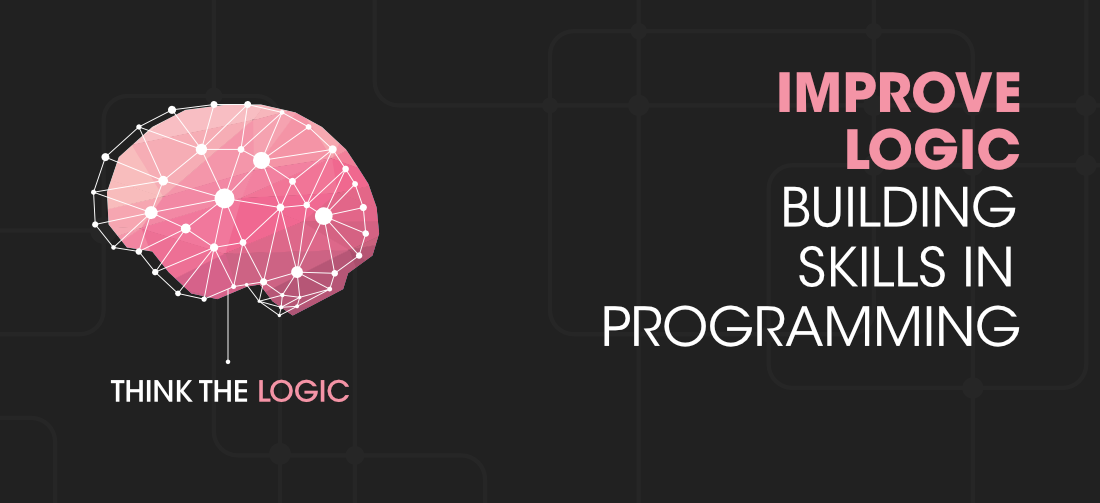
How to Improve Your Logic-Building Skills in Programming?
Here are the ways in which you can improve your logic-building skills in programming. So let’s get started!!!
1. Concepts are Building Blocks for Programming
While trying to crack the logic of any coding problem, many of us think that we never came across such algorithms or theorems while studying and therefore are not able to solve the problem. In order to solve any problem, we should know the concepts of that topic, then only we would be able to apply them and solve the problem. Theoretical knowledge and concepts can be gained by reading articles, blogs, documentation, and watching videos based on that topic. You can also refer to the articles on GeeksforGeeks for building your concepts. We should also know the application of concepts and practice some important problems based on that topic.
2. Be Consistent
Many times it happens that we take up a challenge to solve a question for some number of days and then discontinue in the middle after some days!! It is a popular saying that practice makes a man perfect!! The same is the case with building programming logic. Make it a point to revise, or read an article or solve a question daily despite being very busy with remaining activities. Practicing consistently will help a lot in the overall logic-building process. In order to motivate yourself, you should always contemplate the reason why you started, reward yourself, and make programming fun by solving some quizzes and experimenting with the programs to see different outputs.
3. Pen and Paper Approach
After seeing any problem, we generally start coding the same on our IDE. So, when we are asked to write code on paper in interviews, we fail to do so. Always try to write the pseudo code or algorithm of the code before implementing them. It will help you in writing the code and the next time whenever you approach a similar problem you will be able to recollect more easily. It will also help you in getting syntactically strong.
4. Revision is Very Important
Many of you might be facing this issue that you learn a particular concept but after a few days or months when another question with the same logic or concept appears, you are unable to solve it. This is because you haven’t revised the concepts. Always make it a point to write down the important concepts and logic of questions that are important and keep them revised again and again. This will help you in recollecting the concepts easily.
5. Do as Many Questions as You Can
It happens with most of us that there comes a single question and most of us get stuck there for 4 to 5 days and still are not able to crack it. Always try to practice lots of questions in order to develop your programming logic skills. This will help you in improving your logic building. If you are stuck on a single question, don’t spend a lot of time after a single question instead look for the concepts hidden behind the question.
6. Puzzle Solving
In many coding competitions, problems are not directly asked based on a concept. Instead, it generally involves a story woven around it, and we have to figure out the logic for solving the program. In such cases, sometimes we are unable to solve the problem. Try solving puzzles such as Sudoku to develop your logic and thinking ability because programming is nothing but solving complex problems with the help of good logic.
7. Follow Step-by-Step Approach
We don’t start running since the day we are born. Similar logic applies to coding also. We should not directly jump to difficult questions. We should go from Basic to Advance questions. You can take the ratio of questions such while choosing 10 questions you can divide them into 5 easy, 3 medium, and 2 hard questions. You can find these questions on many good websites. Sometimes, people solve a lot of easy questions from all the sites, but they are not able to solve medium-level questions. Instead, make a balance of all the levels. This will help in clearing the coding tests while placements as most of the questions are from easy to medium level.
8. Find a Programmer’s Community
Sometimes we get bored while solving problems by ourselves with no one to teach or guide us. In such cases, you can always try discussing solutions or complex questions with fellow programmers and friends. This will always help you in finding new logic for the same problem and will help you in optimizing your code. This will also improve your confidence and communication skills!!
9. Go through the Editorials
It happens a lot of times that we are not able to solve some questions, so we just leave the question or understand the editorial and move forward without implementing it. After programming any question, go through the editorial section and the top submissions of the code. Here you will be able to find optimized and different logic for the same code. Try to implement the solutions in the editorial section after understanding them, so that the next time you find such a question you will be able to solve it.
10. Take Part in Coding Challenges
Most people are aware of coding challenges and if you want to build your logical skills then you must keep taking part in the same. Taking part regularly in coding challenges is very useful as it makes you familiar with the logical mindset. In a coding challenge, there are numerous types of questions that provide you with a lot of exposure. Also, taking part in such challenges allows you to see solutions of various codes provided by different coders and helps you if stuck at some point.
11. Learn New Things Regularly
Programmers should never stop learning or being stuck on one topic. They must keep on solving multiple topics as it will help them to expand their area of knowledge by building technical skills. The aim should be solving new problems daily and not being stuck to the old pattern or algorithm in order to achieve success. However, at times some topics are a bit tough and take numerous attempts to solve, in that case, stop solving that and go on to the next one as sometimes new problems are helpful in solving the old ones.
12. Understand Mathematical Concepts
Mathematics is an important aspect of programming and understanding properly will help you in making numerous visuals or graphs, coding in applications, simulation, problem-solving applications, design of algorithms, etc.
13. Build Projects
Project building is another task that will enhance your logical building skills in programming. It challenges your ability to tackling with new things by using different methods and tactics. It is recommended that you must build one project in order to get a proper clarity of the subject and assess yourself in order to work ahead efficiently.
14. Notes Preparation
Notes are saviors and if one does that regularly then nothing can beat them from achieving their goal. While making notes you must write down every trick, concept, and algorithm so that if you need it again it is easily available. So if you are solving any problem then make sure to note down the library functions it will also be helpful for your future interviews. Noting down basic algorithms such as merge sort, binary search, etc. will help you if you are stuck somewhere.
15. Patience is the Key
Most of the time we leave programming after some days just because we are unable to solve the questions. Let’s always motivate ourselves by saying let’s just try one more time differently, before we decide to quit!!!
If you’ll patiently work on your programming logic skills and follow the tips which we have shared with you, no one can stop you from being a good programmer and you will surely crack all the coding tests and interviews!!!
Please Login to comment...
Similar reads.
- Technical Scripter 2020
- Technical Scripter
- Google Releases ‘Prompting Guide’ With Tips For Gemini In Workspace
- Google Cloud Next 24 | Gmail Voice Input, Gemini for Google Chat, Meet ‘Translate for me,’ & More
- 10 Best Viber Alternatives for Better Communication
- 12 Best Database Management Software in 2024
- 30 OOPs Interview Questions and Answers (2024)
Improve your Coding Skills with Practice
What kind of Experience do you want to share?
Forgot password? New user? Sign up
Existing user? Log in
- Number Theory
- Probability
- Everyday Math
- Classical Mechanics
- Electricity and Magnetism
- Computer Science
- Quantitative Finance
Take a guided, problem-solving based approach to learning Logic. These compilations provide unique perspectives and applications you won't find anywhere else.
What's inside
- Introduction
- Puzzles and Riddles
- Multi-Level Thinking
- The Rational Detective
- Syllogisms and Sets
- Logic Machines
- Arithmetic With Logic Gates
- Propositional Logic
- First-Order Logic
Joy of Problem Solving
- Intro to Problem Solving
- Coin Rearrangements
- Truth Tellers and Liars
- Operator Searches
- Matchstick Puzzles
Community Wiki
Browse through thousands of Logic wikis written by our community of experts.
- Truth-Tellers and Liars
- Cryptogram - Problem Solving
- Solving Propositional Logic Word Problem
- Mind Reading with Math
- Information Compression
- K-level thinking
- Chess Puzzles
- Arithmetic Puzzles - Operator Search
- Arithmetic Puzzles - Fill in the Blanks
- Elimination Grids
- Grid Puzzles
- Combinatorial Games - Definition
- Combinatorial Games - Winning Positions
- Tic Tac Toe
- Sprague Grundy Theorem
- Chess Puzzles - Reduced Games
- Chess Puzzles - Opening Strategies
- Chess Puzzles - Rook Strategies
- Rook Polynomial
- Game Theory
- Nash Equilibrium
- Zero-Sum Games
- Prisoner's Dilemma
- Braess' Paradox
- Utility Functions
- Cognitive Bias
- Monty Hall Problem
- Birthday Problem
- Two-Envelope Paradox
- Simpson's Paradox
- Berkson's Paradox
- Newcomb's Paradox
- Benford's Law
- Mathematics of Voting
- Survivorship Bias
- Russell's Paradox
- Zeno's Paradox
- Gabriel's Horn
- Truth Tables
- Proof by Contradiction
- Mathematical Logic and Computability
- Mathematical Logic and Computability II (continuation)
- Propositional Logic Using Algebra
- Venn Diagram
- Predicate Logic
Problem Loading...
Note Loading...
Set Loading...
10 Tips to Build and Improve Logic Building in Programming 6 min read
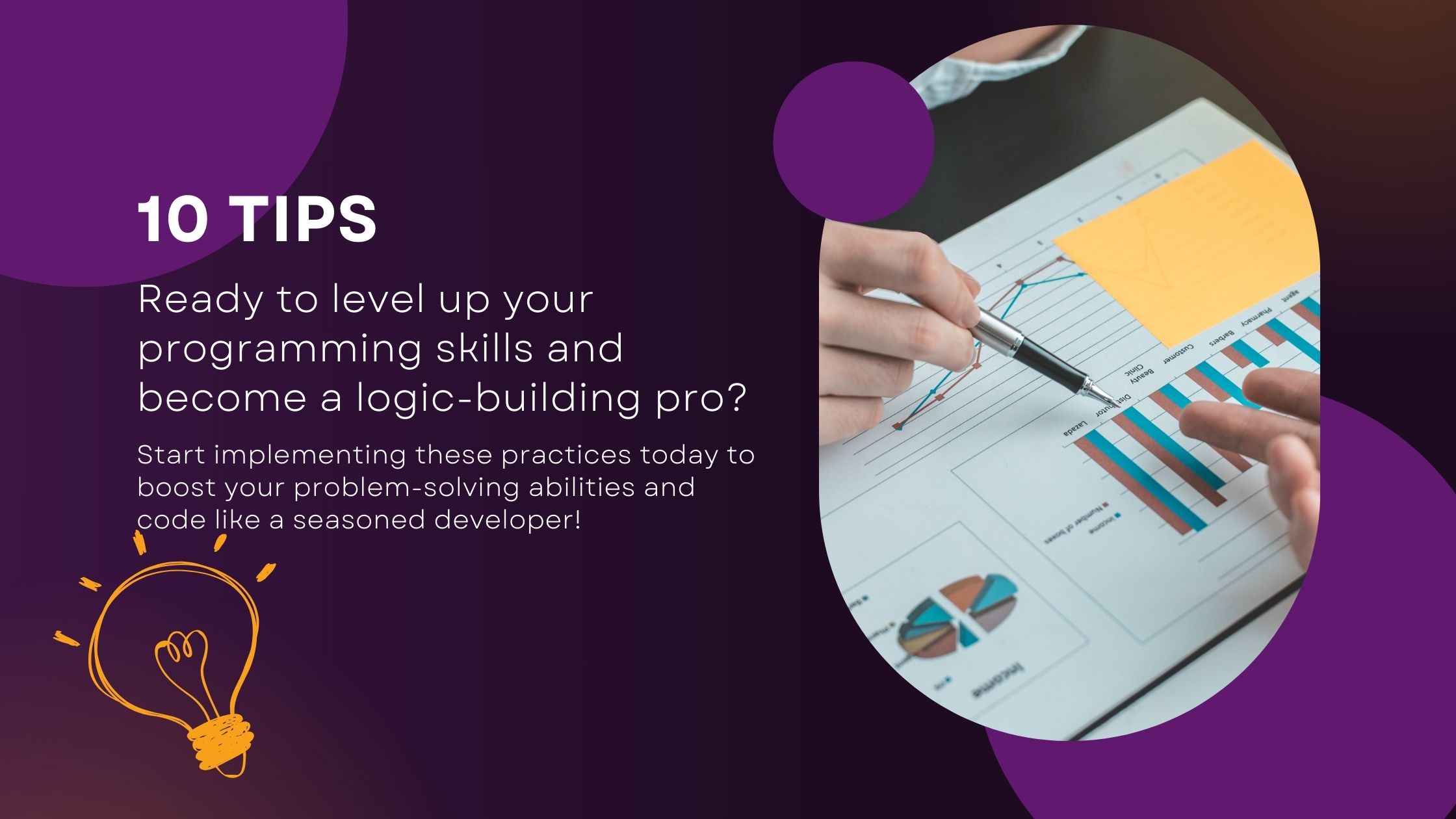
Are you an aspiring developer, researcher, or analyst looking to enhance your logic-building skills in programming? Logic is the foundation of effective programming and plays a crucial role in problem-solving and creating efficient code.
Whether you are a beginner or have some experience in coding, there are always ways to improve your logic-building abilities. In this article, we will explore ten valuable tips to help you build and enhance your logic skills in programming. So let’s dive in!
1. Understand the Fundamentals
To build a strong foundation in logic building, it is essential to have a solid understanding of programming fundamentals.
Concepts such as variables, loops, conditionals, and data structures are the building blocks of logical thinking in programming.
Take the time to learn these concepts thoroughly and practice implementing them in your code. Online tutorials, books, and coding courses can be valuable resources to enhance your understanding of programming fundamentals. Some important links:
- W3Schools – Python Fundamentals
- Codecademy – Fundamentals of Programming
- Coursera – Programming for Everybody
Example/Usage: When working on a project, understanding variables helps in storing and manipulating data. For instance, in a web application, variables can be used to store user inputs or preferences.
2. Break Down Problems into Smaller Parts
One of the most effective strategies for improving logic-building skills is to break down complex problems into smaller, more manageable parts. This approach allows you to tackle each component individually and then combine them to create a comprehensive solution.
Breaking down problems helps you analyze the problem’s requirements, identify potential challenges, and develop a step-by-step plan to solve them.
This systematic approach enhances your logical thinking and problem-solving abilities.
Some important links:
- GeeksforGeeks – Divide and Conquer
- HackerRank – Problem Solving Techniques
Example/Usage: Breaking down a large feature into smaller tasks is akin to dividing a complex algorithm into manageable steps, making it easier to implement and debug.
3. Practice Problem-Solving
Just like any other skill, logic-building in programming improves with practice. Engaging in regular problem-solving exercises helps you sharpen your logical thinking and exposes you to various coding challenges.
Platforms like LeetCode, HackerRank, and CodeSignal offer a wide range of coding problems that you can solve to enhance your logic-building skills.
Challenge yourself with different difficulty levels and strive to find the most efficient solutions. Remember, practice makes perfect!
- HackerRank – Problem Solving
Example/Usage : Regularly solving coding challenges on platforms like LeetCode hones problem-solving skills, making you adept at handling various scenarios.
4. Study and Analyze Existing Code
Studying and analyzing existing code is an excellent way to improve your logic-building skills. Dive into open-source projects, explore code repositories on platforms like GitHub, and examine how experienced programmers approach different problems.
Analyzing well-written code helps you understand different logic-building techniques, learn best practices, and discover new ways to solve problems efficiently.
By studying code, you expand your knowledge and gain insights into logical thinking in programming.
- GitHub – Explore Repositories
- Stack Overflow – Code Snippets
- GitLab – Open Source Projects
Example/Usage: Studying well-written code on platforms like GitHub provides insights into effective logic-building techniques, fostering a deeper understanding of programming.
5. Collaborate with Peers
Collaboration with fellow programmers is a valuable strategy to improve your logic-building skills. Working with others exposes you to different perspectives, ideas, and approaches to problem-solving.
It allows you to learn from their experiences, exchange knowledge, and discover alternative solutions to coding challenges. Participate in coding communities, join coding forums, or even form study groups with like-minded individuals.
By collaborating with peers, you can enhance your logical thinking through shared learning and collective problem-solving.
- Stack Overflow – Collaborate
- GitHub – Collaboration Tools
- Reddit – Programming Community
Example/Usage: Collaborating on a shared project with peers exposes you to diverse solutions, helping refine your logical thinking through shared learning.
6. Implement Pseudocode
Before diving into writing code, it is beneficial to plan your approach using pseudocode. Pseudocode is a simplified version of your code that focuses on the logic and algorithmic steps without worrying about the syntax.
By writing pseudocode, you can outline the logical flow of your program, identify potential issues, and refine your solution before implementing it in a specific programming language.
Pseudocode serves as a blueprint for your code and helps you develop a more logical and structured approach to problem-solving.
- GeeksforGeeks – Introduction to Pseudocode
- Khan Academy – Introduction to Algorithms
Example/Usage: Imagine you’re building a system to automate an inventory process. Before coding, use pseudocode to plan out how the system will check stock levels, reorder products, and update the inventory database. It’s like creating a strategic game plan before hitting the coding field!
7. Explore Different Programming Paradigms
Familiarizing yourself with different programming paradigms can significantly improve your logic-building skills. Programming paradigms, such as procedural, object-oriented, functional, and logical programming, offer different approaches to problem-solving.
Each paradigm has its own set of principles and techniques that can expand your logical thinking abilities. By exploring various paradigms, you can gain a broader perspective on programming and develop a more versatile and adaptable approach to logic building.
- GeeksforGeeks – Introduction to Programming Paradigms
- Medium – Understanding Programming Paradigms
- Coursera – Programming Paradigms by Stanford University
8. Continuously Learn and Update Your Knowledge
The field of programming is constantly evolving, with new technologies and methodologies emerging regularly. To stay ahead and enhance your logic-building skills, it is crucial to keep learning and updating your knowledge.
Stay updated with the latest programming languages, frameworks, and tools relevant to your field. Engage in online courses, attend coding conferences and workshops, and participate in webinars to expand your understanding of programming concepts and logical thinking techniques.
- Udemy – Online Programming Courses
- Coursera – Computer Science Courses
- freeCodeCamp – Learn to Code for Free
9. Seek Feedback and Learn from Mistakes
Seeking feedback and learning from your mistakes is an essential aspect of improving logic-building skills in programming. Share your code with experienced programmers, mentors, or colleagues and ask for constructive feedback.
Their insights can help you identify areas for improvement, discover more efficient solutions, and refine your logical thinking process. Embrace failure as an opportunity for growth and view mistakes as valuable learning experiences.
By learning from your mistakes, you can continuously improve your logic-building abilities.
10. Stay Persistent and Practice Patience
Developing strong logic-building skills in programming takes time and persistence. It is essential to stay patient and keep practicing, even when faced with complex problems or challenging coding tasks.
Rome wasn’t built in a day, and neither will your logical thinking abilities. Embrace the learning process, celebrate small victories, and don’t be discouraged by setbacks. With persistence and patience, you will gradually develop a deeper understanding of logic in programming and become a more proficient programmer.
In conclusion, logic-building skills are fundamental to becoming a successful programmer, researcher, or analyst. By implementing these ten tips, you can enhance your logical thinking abilities and improve your logic-building skills in programming.
Embrace the journey of logic building and enjoy the process of becoming a more skilled and logical thinker in the world of programming.
Happy learning!
Related Posts:
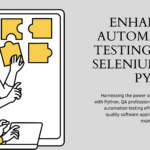
- AI Applications
- Artificial Intelligence (AI)
- Cloud Architecture
- JavaScript & Frameworks
- Learning & Skill Development
- Machine Learning
- Programming
AI Cloud Deployment Data Extraction express framework Front-end Development Fullstack Developer Fullstack Development JavaScript Javascript Framework JSX Mongo MongoDB Node.js Python QA React Framework Selenium UI frameworks Web Developer Web Development Skills
Recent Posts
- 10 Tips to Build and Improve Logic Building in Programming 6 min read by Austin Noronha
- How to Start Your Coding Journey: A Beginner’s Guide to AI 11 min read by Austin Noronha
- IT System Integrators Leading the Way to AI Adoption 8 min read by Austin Noronha
- Getting Started with Next.js: A Step-by-Step Guide 9 min read by Austin Noronha
- Next.js: Revolutionizing Web Development in 2023 15 min read by Austin Noronha
Have any questions?
If you’ve got any questions or need guidance on your coding journey, don’t hesitate to reach out! Head over to Contact Us or drop your query at Ask BuzzCoder . We’re here to help you unlock the exciting world of coding! Happy coding!
📬 Unlock Tech Insights!
Join the buzzing code newsletter.
Don’t miss out – join our community of tech enthusiasts and elevate your knowledge. Let’s code the future together!
Share on Mastodon
How to Develop Programming Logic: A Step-by-Step Guide
Programming logic is a crucial skill for any developer. It involves breaking down complex problems into smaller, more manageable parts and using logical reasoning to solve them. Developing programming logic takes time and practice, but it is an essential skill that can help you write more efficient and effective code.
One of the best ways to develop programming logic is to practice solving problems. By working through a variety of programming challenges, you can improve your ability to think logically and creatively. It’s important to focus not just on finding the solution, but also on understanding how you arrived at that solution. This can help you develop a more intuitive sense of how to approach different types of problems.
Another key aspect of developing programming logic is to learn from others. This can involve reading code written by more experienced developers, studying algorithms and data structures, or participating in online forums and discussion groups. By exposing yourself to different ways of thinking about problems, you can broaden your understanding of programming concepts and develop a more diverse set of problem-solving strategies.
Understanding Programming Logic
Programming logic is the process of designing and implementing a set of instructions that a computer can follow to solve a problem or complete a task. It involves breaking down complex problems into smaller, more manageable parts, and then using logical reasoning to develop a solution. Programming logic is a fundamental concept in computer science, and it is essential for anyone who wants to become a skilled programmer.
What is Programming Logic?
Programming logic is the foundation of computer programming. It is the process of taking a complex problem and breaking it down into smaller, more manageable parts. This process involves analyzing the problem, identifying its key components, and developing a logical plan to solve it. Once the plan is developed, the programmer can then write the code necessary to implement the solution.
Programming logic often involves the use of flowcharts, pseudocode, and other visual aids to help the programmer understand the problem and develop a solution. These tools can help to simplify complex problems and make them easier to understand.
Why is Programming Logic Important?
Programming logic is important because it helps programmers to develop efficient, effective solutions to complex problems. By breaking down a problem into smaller parts and developing a logical plan to solve it, programmers can avoid common pitfalls such as inefficient code, bugs, and errors.
Programming logic is also important because it helps programmers to develop solutions that are easy to maintain and update. By using a logical, step-by-step approach, programmers can create code that is easy to understand and modify as needed.
Finally, programming logic is important because it is a fundamental skill that is required for many different programming languages and environments. Whether you are working with web development, mobile app development, or desktop applications, programming logic is a critical skill that you will need to master in order to be successful.
Steps to Develop Programming Logic
Developing programming logic is a crucial skill required for every programmer. It helps in breaking down complex problems into smaller, more manageable parts, making it easier to solve them. Here are the steps that programmers can follow to develop programming logic:
Step 1: Understand the Problem
The first step in developing programming logic is to understand the problem. The programmer needs to analyze the problem statement and identify the requirements, constraints, and goals of the program. They should ask questions to clarify any doubts and ensure that they have a clear understanding of the problem.
Step 2: Break Down the Problem into Smaller Parts
The next step is to break down the problem into smaller, more manageable parts. This helps in identifying the key components of the program and the relationships between them. The programmer can use various techniques, such as top-down design or object-oriented design, to break down the problem into smaller parts.
Step 3: Identify the Inputs and Outputs
After breaking down the problem, the programmer needs to identify the inputs and outputs of the program. Inputs are the data that the program receives, and outputs are the results that the program produces. Identifying the inputs and outputs helps in understanding the flow of data in the program and designing the program accordingly.
Step 4: Create a Flowchart or Pseudocode
Once the inputs and outputs are identified, the programmer can create a flowchart or pseudocode to represent the program’s logic. A flowchart is a visual representation of the program’s flow, while pseudocode is a textual representation of the program’s logic. Creating a flowchart or pseudocode helps in designing the program’s structure and identifying any potential issues.
Step 5: Write the Actual Code
After creating the flowchart or pseudocode, the programmer can start writing the actual code. They should follow the program’s structure and use the programming language’s syntax to write the code. The programmer should also ensure that the code is optimized, efficient, and easy to read and understand.
Step 6: Test and Debug the Code
Once the code is written, the programmer needs to test and debug the code. They should run the program and check if it produces the desired results. If there are any errors or bugs, they should identify and fix them. Testing and debugging help in ensuring that the program works as expected and meets the requirements.
Tips for Developing Strong Programming Logic
Programming logic is the foundation of any successful coding project. It involves the ability to think logically and solve complex problems through coding. Here are some tips to help develop strong programming logic skills:
Use Simple Language
One of the most important aspects of programming logic is the ability to communicate effectively. Using simple language can help ensure that the code is easy to understand and maintain. Avoid using technical jargon or complex terms that may confuse others. Instead, use clear and concise language that conveys the intended meaning without ambiguity.
Avoid Repetition
Repetition in code can lead to errors and make it difficult to read and understand. It’s important to avoid repeating code whenever possible. Instead, use functions or loops to simplify the code and make it more efficient. This can also make it easier to debug and maintain the code in the future.
Stay Organized
Organizing the code can make it easier to read and understand. Use comments to explain the purpose of the code and any relevant details. Group related code together and use indentation to show the structure of the code. This can make it easier to follow the logic of the code and identify any errors.
Practice Regularly
Like any skill, programming logic requires practice to develop. Regular practice can help improve problem-solving abilities and increase familiarity with different programming concepts. Practice coding exercises, puzzles, and challenges to strengthen programming logic skills and become a better programmer.
Developing programming logic is a crucial skill for any aspiring developer. It requires a lot of practice and patience to master, but the rewards are well worth the effort. By following the tips and techniques outlined in this article, developers can improve their logical thinking and become better at solving complex problems.
One of the most important things to keep in mind when developing programming logic is to break down problems into smaller, more manageable pieces. This allows developers to focus on one aspect of the problem at a time and reduces the likelihood of getting overwhelmed.
Another key tip is to practice regularly. The more developers practice, the more comfortable they will become with logical thinking, and the easier it will be to apply that thinking to real-world programming challenges.
Finally, developers should not be afraid to seek help and guidance from others. Whether it’s through online forums, coding communities, or mentorship programs, there are many resources available to help developers improve their logical thinking and programming skills.
1 thought on “How to Develop Programming Logic: A Step-by-Step Guide”
C’est vraiment bien cette programmation
Leave a Comment Cancel reply
Save my name, email, and website in this browser for the next time I comment.
8 Tips for Beginners to Improve Programming Logic
Suvankar das.
- April 8, 2024
- No Comments

Programming logic forms the basis for all the code. It is about how we think and structure the programs to make them work efficiently and flawlessly. Good programming logic can enhance code quality, making the code more robust and bug-free. Thereby boosting efficiency by allowing you to write more concise and organized code.
In fact, according to a HackerRank 2023 Developer Skills Report , 70% of employers say that problem-solving skills are more important than programming language knowledge.
Whether you are aspiring to be a web developer, app creator, or software engineer, these eight beginner-friendly tips will help you grasp the fundamentals of programming logic and set you on the path to becoming a skilled programmer.
8. Don’t hesitate to Debug and Review
Recommended reads, can i become a good programmer without honing my logic-building skills, essential tips for improving your programming logic skills, 1. practice regularly and consistently.
When it comes to enhancing the programming logic, there is a famous saying that goes, “ Practice makes perfect .” This holds true for programming as well. Regular and consistent practice is important. It is the key to improving your logic-building skills.
According to a study by Codecademy, 85% of learners stated that a consistent coding routine led to faster improvement.
The essential part of the process is to keep coding vigorously and writing solutions regularly. This routine helps sharpen your logical thinking and problem-solving skills.
2. Learn Data Structures & Algorithms
I. data structures.
When you learn about data structures, you are essentially exploring different ways to organize and store data in your programs. This allows you to choose the most efficient data structure for a specific task, making your code run faster and use less memory.
For example, one might examine how arrays, linked lists, or trees work and why one might be more suitable for a particular problem than the others. This process helps you develop better programming reasoning.
II. Algorithms
Algorithms are step-by-step instructions for solving problems. Understanding algorithms is essential for writing code that performs well and is maintainable. A good way to understand algorithms is to explore sorting algorithms. This knowledge strengthens your logical thinking and problem-solving abilities in programming.
3. Break Down Complex Problems
Breaking down problems is an important skill in problem-solving. Much like programming, this process involves dissecting large issues into manageable tasks or steps. Begin by initially conceptualizing the issue, and if needed, sketch it out on paper.
Pinpoint the primary challenges at hand. Start with the simpler problems, tackling them before moving to more challenging aspects. Persistence is key. By solving each smaller part, your problem-solving skills and logical reasoning will improve.
4. Study and Understand Other Programmers’ Code
Studying other programmers’ code is a great learning opportunity. When you explore open-source repositories and diverse sources, you are exposed to different coding styles and approaches. GitHub is the best example of this. It provides a vast repository of open-source projects, allowing you to learn from real-world code examples.
This practice allows one to compare problem-solving skills with others and grasp different logical thinking processes. By delving into their code, you gain insights into their strategies. It broadens your understanding of best practices and enhances your adaptability. Also, it is an excellent way to learn from experienced developers.
5. Participate in Coding Challenges and Learn from Feedback
Coding challenges are a fantastic way to sharpen logical thinking. The challenges are hosted on various websites like TopCoder, Coderbyte, and LeetCode . They not only test your coding skills but also offer solutions from fellow programmers, providing a learning opportunity. By comparing your code with theirs, you can improve your problem-solving abilities.
Consider tackling the most challenging coding tasks and bug bounty programs from tech giants like Microsoft, Google, and Amazon. These experiences will take your coding skills to the next level. The key is to embrace feedback and learn from the mistakes.
6. Adopt Different Programming Paradigms
Understanding different programming paradigms is a valuable skill for any programmer. These paradigms are like blueprints, guiding how to design and structure code. For example, one of the paradigms, the Object-Oriented Paradigm (OOP) emphasizes organizing data and behavior into objects. Learning this helps you create well-structured and modular code.
Another one of the paradigms, functional programming teaches you to approach problem-solving differently by using functions as first-class citizens. This can lead to more elegant and concise solutions. Adopting various programming paradigms expands your toolkit and develops a more versatile mindset.
7. Write Clear and Readable Code
Clear and readable code is key to becoming a skilled programmer. Code that is easy to understand brings numerous benefits. It is easy to maintain, simpler to debug, and less likely to contain errors. Use meaningful variable names that reflect their purpose, making it easier for others to grasp your code. Additionally, write comments that explain your code’s functionality and logic.
Comments serve as a roadmap for anyone reading your code, helping them understand your thought process. At last, maintain consistent formatting throughout your code. It promotes uniformity and ensures that your code is approachable and friendly to others who may need to work with it.
Debugging is also an important skill for programmers. Debugging skills can reduce development time by up to 25% as per a study by JetBrains.
It’s not just about fixing errors, it is a powerful learning tool too. When you debug, you dive into your code, discover why something isn’t working as expected, and find the solution. You understand its flow and logic better. Debugging ways, like breakpoints and print statements, help you pinpoint issues.
Check this video out : 3 Habits to Build for Improving Your Logic & Programming Skills
In conclusion, strong programming logic is the foundation of becoming a proficient programmer. As highlighted, it demands unwavering practice, problem-solving accuracy, the ability to think logically, breaking complex problems into simple components, writing clear and easy code, meticulous debugging, and embracing your mistakes as learning opportunities are your steadfast allies on this journey.
Best Programming Languages for Android App Development
13 Types of Software Development
What is the significance of programming logic in coding?
Programming logic is vital in coding as it provides the framework for connecting different components and enabling computers to perform tasks. The clearer your program logic, the easier it is to develop, evaluate, and execute activities within a project.
How can I enhance my programming logic skills as a beginner?
To improve your programming logic skills, practice regularly, expand your knowledge base, and maintain consistency. Stay motivated and develop a strong grasp of data structures and algorithms, as these also play a crucial role in logic building.

Does programming logic vary between different programming languages?
No, programming logic itself remains consistent across programming languages. It defines the rules and facts that computers use for reasoning. However, the implementation of logic can differ between languages and even within the same language.
Why is logic essential for programming?
Logic is fundamental to programming because it underpins the creation of complex algorithms and the solution of problems. Without strong logic-building skills, one cannot become a proficient developer, as programming inherently demands logical thinking and problem-solving abilities.
No, it’s challenging to become a skilled programmer without improving your logic-building skills. Programming inherently relies on logic and sophisticated algorithms. Effective problem-solving and coding are unattainable without a solid foundation in programming logic.
Recent posts
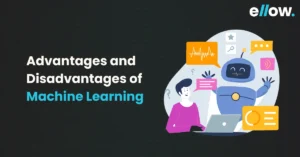
Advantages and Disadvantages of Machine Learning

Advantages and Disadvantages of HTML

High-demand IT Jobs for 2024: Skills that will get you hired
Hire vetted remote talent you can trust

Top Developers
Hire Generative AI Developers
Hire a Part-time CTO
Hire a Software Developers
Hire Full Stack Developer
Hire an App Developers
Hire Node.js Developers
Hire React.js Developers
Hire Python Developer
Hire Java Developers
Hire Vue.js Developers
Hire Swift Developers
Hire No Code Developers
Hire MERN Stack Developer
Hire React Native Developer
Hire .NET Developers
Hire PHP Developers
Hire Magento Developers
Hire Next.js Developers
Hire Go Developers
Hire Blockchain Developers
Hire Prompt Engineers
Hire Ruby Developers
Hire Typescript Developers
Hire a DevOps Engineer
Hire Android Developer
Hire Xamarin Developer
Hire Flutter Developer
Hire iOS Developer
Hire JavaScript Developers
Hire ChatGPT Developer
Hire Chatbot Developer
Hire Kotlin Developers
Hire Ruby on Rails Developer
Careers at ellow
Write for us
Register as a Service provider
Hire Developers
Job Listing
IT Staffing Services
Alternatives
Toptal Alternatives
Turing Alternatives
Flexiple Alternatives
Copyright © 2024 Hire Vetted Remote Developers & Designers
Privacy Policy | Terms of Service

Hire developers effortlessly using our Intelligent Talent Cloud powered by AI.

DEV Community
Posted on Feb 6, 2020 • Updated on Feb 8, 2020
9 Things You Should Practice for Logic Building
When I started my journey as a Programmer in 2017 my mind was always stuck on the logic building part and it still does the same sometimes but not that much, But how it possible? It is possible because of practice.
When I started my first job I was working on a very complicated project which I started from stretch all the backend logics was built by me using Node JS. I learned a lot during that time but learning new technologies will not help you with the logic building but when I was writing code on that project I touch a few things from the list below without knowing it.
You should try and practice these things as soon as possible to improve problem-solving and logic building skills but first learn a programming language so that you will confident enough to work with all of these things because these things need basic programming knowledge of any language i.e JS, Java Python, etc just learn core for these things no frameworks/libraries are required.
Data Structures: A data structure is a data organization, management, and storage format that enables efficient access and modification i.e Linked List, Binary Search Tree, Hash Table, etc.
Algorithms: An algorithm is a step by step method of solving a problem i.e FizzBuzz, Fibonacci and there are a lot of algorithms even you can build your own but try to practice toughest algorithms.
Design Patterns: They are typical solutions to commonly occurring problems in software design.
Programming Paradigms: A programming paradigm is a style, or way, of programming i.e OOP, Functional, etc.
Competitive Programming: It is all about solving problems revolving around algorithms and data structures as quickly as possible. If you want to improve this skill then challenge yourself that you can write an algorithm in 1 minute and start your stopwatch and after 1 minute stop. if this is boring then try another way of doing it and the way is participating in any Speed Programming Competitions to improve this skill well, I’m not a competitive programmer but I will try to improve as much as I can.
Mathematics: Shit! I know but very compulsory for logic building.
Recursive Programming: It is a method where problems are solved by repeatedly calling a function on sub-instances of the problem.
**Dynamic Programming: **It** **is mainly an optimization over plain recursion.
**Refactoring: **Wait! what? I know you are thinking that how code refactoring can help you to improve your logic building skills. Now suppose if you wrote a recursive function with O(n²) complexity if you refactor that code and try to apply dynamic programming techniques so definitely you can improve the time complexity of your codebase. So always refactor your code.
Follow me AKA #slimcoder on medium and github for more articles ❤
Top comments (4)
Templates let you quickly answer FAQs or store snippets for re-use.
- Location Lahore
- Joined Nov 8, 2021
Valuable information !
- Location Remote
- Work Training School
- Joined Nov 21, 2018
Thank you :)
- Joined Dec 20, 2020
Are you sure you want to hide this comment? It will become hidden in your post, but will still be visible via the comment's permalink .
Hide child comments as well
For further actions, you may consider blocking this person and/or reporting abuse

8 BEST Sites to Practice Coding by Exercises 🏋️♂️🎯
Arjun Vijay Prakash - Apr 5

How to be a better developer for you and the others
Christophe Colombier - Apr 7
Build These 5 Full Stack Projects For An Impressive Profile 🌟🛠️
Arjun Vijay Prakash - Apr 7

Mastering Strings - Python
Sakshi - Mar 29

We're a place where coders share, stay up-to-date and grow their careers.
Problem Solving: Introduction to Sets
Learn to read sets from a file and to sort and display them.
- Exercise 1: Loading set B
- Implementation of sorting set A
- Exercise 2: Sorting set B
- Exercise 3: Printing set B
In this lesson, we’ll work on sets. Sets are a well-defined collection of non-repetitive objects. In our case, we’ll only be looking at the sets of integers.
In this lesson, we’ll learn to:
- Read integer sets from a file
- Sort the integer sets
- Display the sets
So let’s start!
Reading sets from a file
Task: Load the two sets A and B from the file.
The file has the following format:
The two sizes (size of A and size of B) followed by set A and set B entries.
Here is a sample file:
As we know, a set cannot contain duplicate elements. Therefore, if a number is added twice, that duplicate should not be allowed to enter the set.
So we will have two sets, say A and B, both containing numbers without repetitions. The numbers can be either positive or negative.
Get hands-on with 1200+ tech skills courses.
8 Ways to Improve Your Logic Building Skills for Programming Bootcamp
Team CodeQuotient / August 10, 2022 / Software Engineering Bootcamp
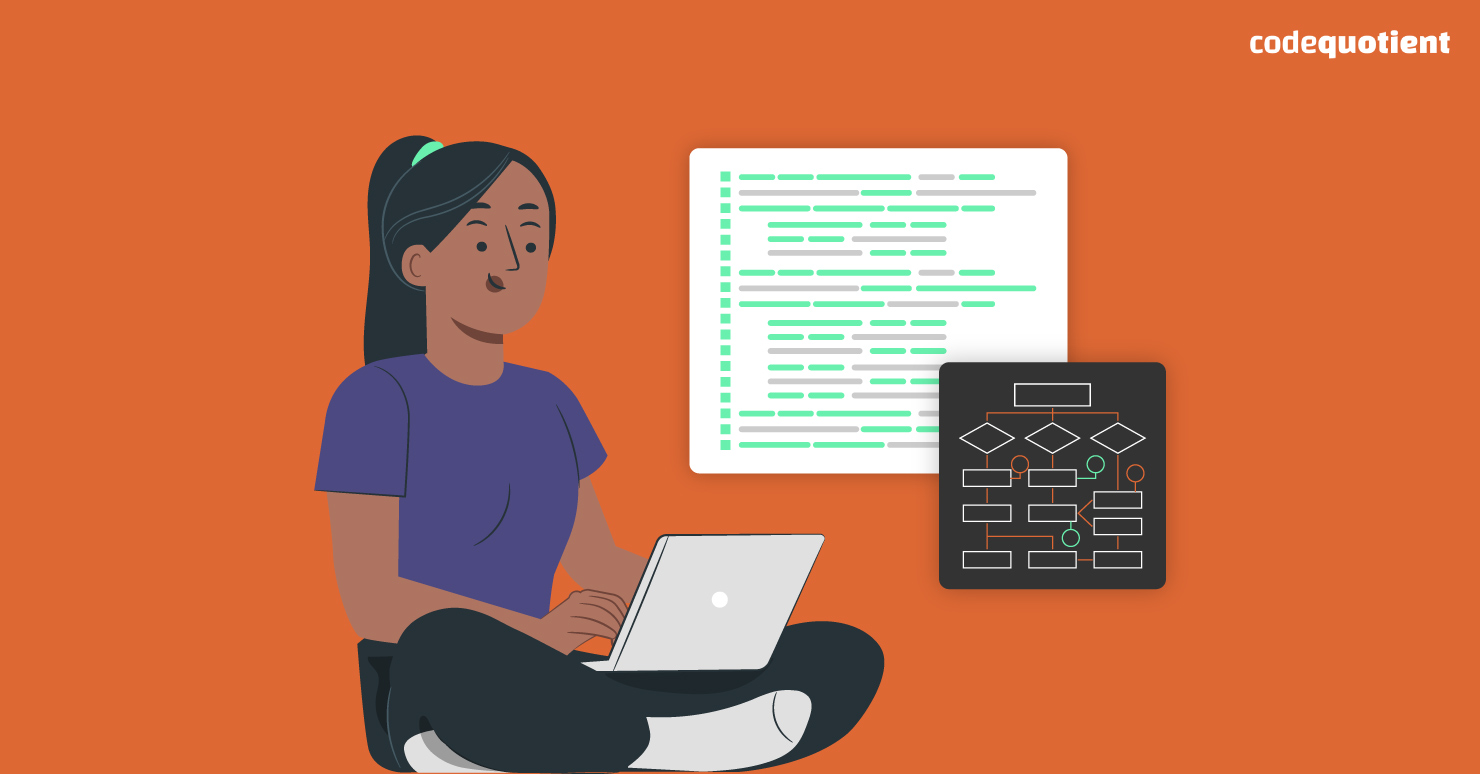
Do you often struggle to devise the appropriate logic to solve coding problems? This is quite common at the initial stage but may persist even after some time. Why is that so? Often, computer science students think they need to learn every programming language on earth to become good programmers. They will join a programming bootcamp straight away, which are usually fast-paced and advanced, and end up feeling lost.
Before joining any advanced course, you need to improve your logical thinking to easily learn as many programming languages as you want. In this article, we will deep dive into the 8 ways to improve your logic-building skills.
If you want to know what a programming bootcamp is and why you should join it , check out our previous article.
How to Improve Your Logic Building Skills for Programming Bootcamp?
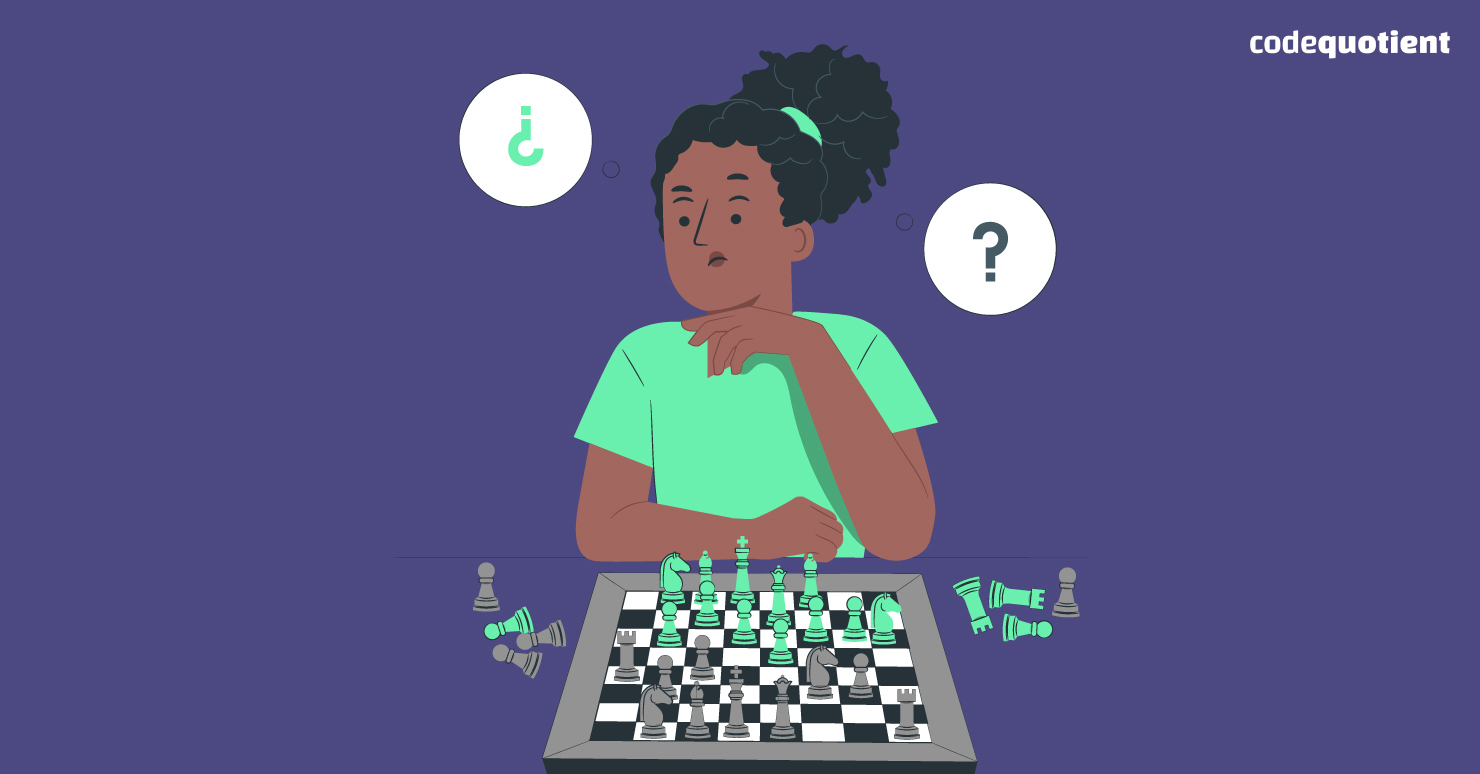
Here are 8 different ways to improve your logic-building skills before joining a programming bootcamp:
1. Improve Your Grasp Over Fundamentals
First, you must clearly understand basic concepts like variables, data types, conditions, functions, loops, and other problem-solving techniques to build a solid foundation. Also, you must learn the data structures and algorithms that help you develop your logical thinking.
Without conceptual clarity, it’s difficult to learn advanced concepts and solve problems. So, don’t just read or watch the theoretical part, but solve questions and write basic programs yourself.
2. Join Coding Communities
Join and be active in coding communities, forums, and groups. If you are stuck on a problem, you will most likely get an answer from someone in these groups and be introduced to different points of view on similar problems.
Also Read: Data Science and Software Developer Internship Trends for 2023: Insights and Opportunities
You can also network with fellow programmers or Bootcamp grads, learn from them, and help others. You can also find experienced professional coders for your project and mentors to guide you.
3. Analyse Other’s Code for Programming Bootcamp
No, we are not telling you to copy. Not all programmers think alike. As you know, there are many ways to solve a particular problem. So, look how your classmate or friend has written a program.
There are many code repositories like GitHub , BitBucket , and SourceForge , where you can view the entire code of a project and try to grasp its logic. You can learn a lot from advanced programmers by observing their programming styles.
4. Participate in Coding Challenges & Hackathons
These time-bound challenges force you to exercise your logic super quickly and come up with accurate solutions, making it a great learning hands-on experience that helps to think faster and improve your logical thinking. You become better at solving problems and writing code with time, and this helps you prepare for advanced-level programming bootcamps. Although we recommend, you don’t focus excessively on winning initially in different online programs.
5. Solve Puzzles
You might have heard about the difficult puzzles that companies like Google, Microsoft, Facebook, and others ask in interviews. Do you know why? Because a person who can solve puzzles is very good at logical thinking and consequently good at programming.
Solve as many logical puzzles and math problems as you can. You can find tons of them online or in a library. We recommend you indulge in at least one puzzle daily to help keep your mind sharp and build soft skills.
6. Play Logical Games
Who doesn’t love to play games? Video games are fun, but try to play more logical games. There are many board games, such as chess, checkers, tiger game, ludo, battleship, etc., or even simple ones like tic-tac-toe, SOS, dots, sudoku, and so on, that help you work the logical muscles of your brain.
If board games are not your thing, you can find many logical games and puzzles online and in your mobile app store. These games are fodder for your brain and sharpen your logical thinking.
7. Learn Different Programming Paradigms
Many programming paradigms, such as procedural, object-oriented (OOP), and functional (FP), are used to solve problems. These paradigms act as blueprints for building projects.
Although OOP is the most popular one, learning from others will help you expand your programming knowledge and improve your general programming skills. You will learn to solve a problem in different ways.
8. Practice, Practice, and Practice
Practice programming by writing code for practical training. You can do this by solving programming questions on websites like GeekForGeeks , CodeChef , and HackerEarth , to name a few.
Don’t do it for a couple of days and stop. Be consistent. Set realistic goals and solve a few questions daily. Start with simple problems and gradually work your way up. You can also use paper and pen to write the logic in the form of an algorithm or flowchart before writing the program on the IDE.
Also Read: 6 things that you need to know before you attend your first coding BootCamp .
9. Mock Interviews
Another powerful way to hone these abilities to join online coding bootcamps is by participating in mock interviews. These simulated sessions allow you to practice breaking down complex problems into structured, step-by-step solutions. By engaging in mock interviews, you’ll not only enhance your analytical thinking but also gain valuable experience in clearly articulating your thought processes, which can give you a job guarantee.
Wrapping Up
Learning a programming language’s syntax doesn’t make you a good programmer. You need to practice, solve problems and improve your logical thinking skills as well. Set realistic goals, be patient, and never give up. Once you get a good programming command, you can join a programming bootcamp to learn advanced skills and have a better chance at cracking interviews for your dream job.
If you are looking for a great coding bootcamp, CodeQuotient ‘s Software Engineering Bootcamp is the best one for you. We cover all the languages with hands-on experience with all the other technical skills, in demand skills, soft skills and techniques needed to grow as a programmer and become a full-stack developer without any additional cost. So, don’t hesitate any longer and build a sustainable career in tech with us. Apply Now !
Get UGC Approved, BCA Degree And Earn While You Do That
Join CodeQuotient's Under-Graduate Program In Software Engineering
Get Paid Internship with Our Hiring Partners to Sponsor Your Fees
100% Placement Assistance
You will also like:
- 6 Tips to Ace Your Online Coding Bootcamp as a Fresher
- 10 Python Basic Programming Questions
- Is Data Structures And Algorithms Important For Web Developers?
- What to Look for When Picking the Best JavaScript Course Online
- Critical Tips To Ace Cognizant Coding Questions
Your email address will not be published. Required fields are marked *
Recent Posts
Aspiring for an early start in the tech industry hcl techbee can be the answer, importance of cultivating lifelong learning mindset in bca course, unhirables: understanding what and who they are.
- Jobs for BCA Freshers: Common Resume Mistakes to Avoid for Job Applications
- Deconstructing the Course Structure of BCA Colleges in Ambala City
- CodeQuotient Advantage: Equipping Students with Cutting-Edge Skills and Real-World Experience
- HCL Tech Bee Salary Trajectory: What to Expect After 5 Years
Subscribe to our newsletter
Get updates about the latest articles, industry news, eBooks & lots more from the world of Tech Recruitment straight to your inbox.
- CEO's Corner
- CodeQuotient School of Technology
- Coding Exams
- Engineering High-Performing Teams
- Founder's Guide
- Software Engineering Bootcamp
- Tech Career Advice
- Uncategorized
You May Also Like .
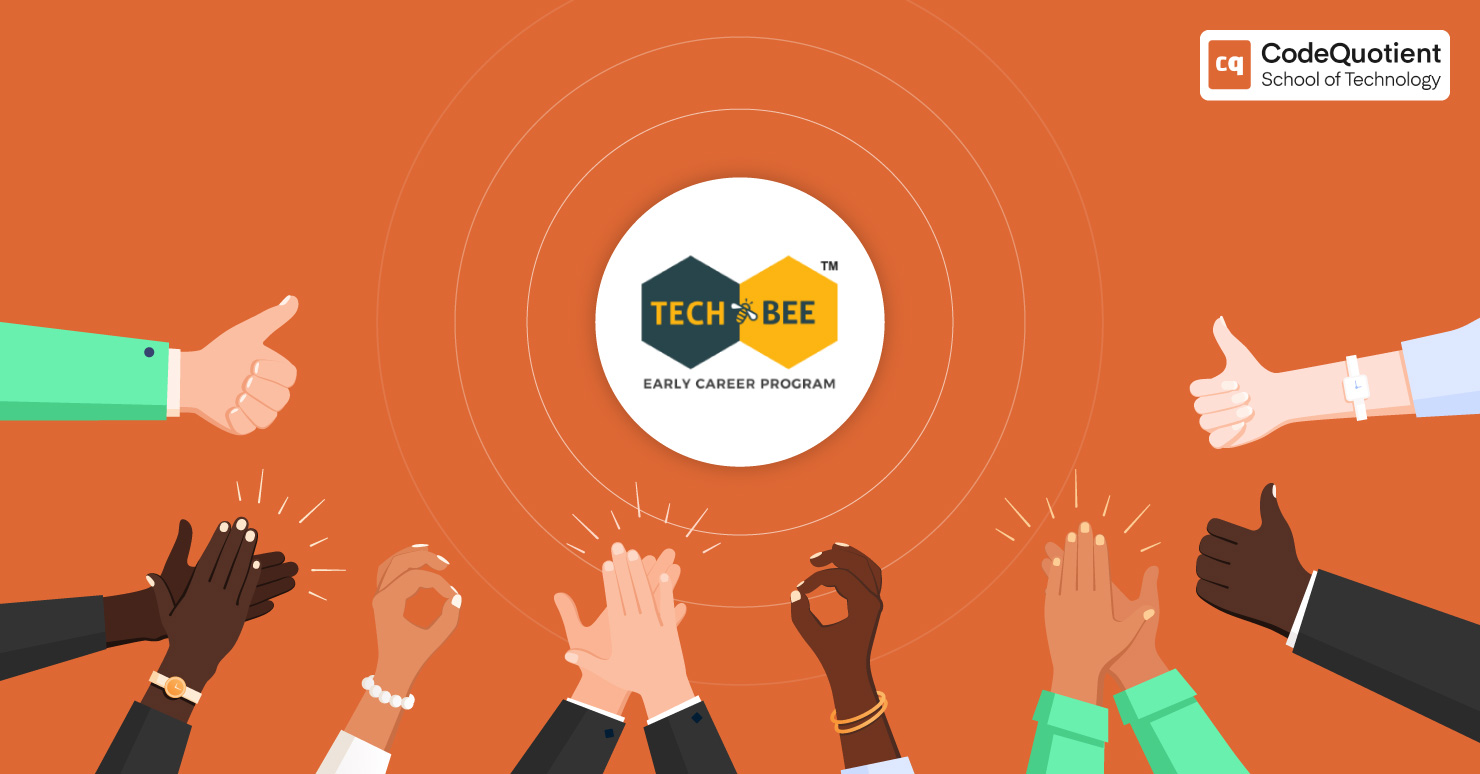
©️ 2024. All Rights Reserved.
About | Blog | Contact | Privacy Policy | Terms and Conditions

LOGIC building & PROBLEM solving
This course introduces students to many basic computer programming topics, using coding examples fro.....

$ 19 /class
About Course
This course introduces students to many basic computer programming topics, using coding examples from various programming languages, pseudocode, and flowcharts. .As an introductory course, students wi
Course Structure
Concepts / Skills Learnt
logic building
why to build logic
how logic building and problem solving interrelated
problem solving
Custom Schedule
UnDivided Attention
Flexible Schedules
Focused Learning Speed
Accredited By : STEM.org
STEM.org is the longest continually-operating, privately-held STEM education research and credentialing organization in America, supporting the world’s top brands, organizations and thousands of educators globally.

Accredited By : UNESCO
UNESCO is the United Nations Educational, Scientific and Cultural Organization. It seeks to build peace through international cooperation in education, sciences and culture.
Requirements
Computer / Desktop With Internet Connection
Learning Path

Background of Educator

Teaching experience
["In person"," professionally"]
Online Classes Handling
I am experienced
Get Certified and stay on top of your game!
Get course certificates as soon as your assignments are over!

Free Logic Building for Beginners Certification Course Online
About this Coding Essentials: Learn Logic Building for Beginners Free Course
This Scaler Topics free online course on logic building for beginners will introduce you to the fundamental concepts of programming logic. You will learn how to approach complex problems, break them down into smaller parts, and solve them logically. The course is suitable for beginners who have no prior programming experience.
What you’ll learn
- You will develop an understanding of programming logic and problem-solving skills.
- Foster the ability to break down complex problems into smaller parts.
- You'll learn to write simple programs using flowcharts and pseudocode.
- It'll improve your logical reasoning and critical thinking skills.
Course Content

Certificate for Free Coding Essentials: Learn Logic Building for Beginners Free Course
Instructor of this course.

Prateek Narang, popular as Prateek Bhaiya is renowned programming instructor and former Google engineer. He has done his B.Tech from Delhi Technological University, and has taught over 100k students in online and offline modes. He is also co-founder of Coding Minutes and his courses are also popular on Udemy. He also leads initiatives at Scaler Topics bringing high quality free content and takes live sessions at Scaler Academy.
Pre-requisites for Free Logic Building for Beginners Certification Course
- There are no prerequisites for this beginner-friendly Logic building course.
- All you need is an internet connection, a laptop with a code editor of your choice, and a passion for learning.
Who Should Learn this Logic Building Free Course for Beginners?
- Anyone who wants to develop their logical thinking and problem-solving skills
- High school and college students who are interested in learning programming
- Beginners who want to start learning programming from scratch
FAQ related to this course
More courses by our top instructors.
Search code, repositories, users, issues, pull requests...
Provide feedback.
We read every piece of feedback, and take your input very seriously.
Saved searches
Use saved searches to filter your results more quickly.
To see all available qualifiers, see our documentation .
logic-building
Here are 37 public repositories matching this topic..., ajayt036 / python-hands-on-challenges.
A collection of all the Coding problems that I have solved to build my foundation of the language and logic. It includes competitive problems from source such as Hacker Rank, Leet code, Kaggle, etc.
- Updated May 27, 2022
- Jupyter Notebook
codingwolf-at / neogcamp-build-logic-solutions
Solutions to neogcamp/build-logic repo
- Updated Aug 10, 2021
imvish21 / Bubble-Game
Bubble Game
- Updated Sep 6, 2023
musamairshad / HackerRank-Practice
Solutions to HackerRank practice problems.
- Updated Feb 26, 2024
adisuyash / BasicsToDSA
A project to foster Learning and Enhancing problem solving skills via Contributions and Collaborations.
- Updated Mar 20, 2024
neeleshio / some-dice-game
Mark the winner whoever reaches the final block
- Updated Nov 24, 2021
Rishav-12 / tictactoe
Play super awesome tic-tac-toe
- Updated Apr 10, 2022
jignesh-kothari / Logical-Programming-Questions
Here in this repository I'll upload most frequently asked logical questions in interviews.
- Updated Jul 5, 2022
MHS-4ever / python-hangman-game
This respiratory contain a .py file containing the complete python code of Hangman Game and a .ppt file containing the complete step-by-step description of the code.
- Updated May 1, 2023
madrascode / basic-python-code
Namaste everyone , In this basic-python-code repository i have included some basic python programs for beginner in programming
- Updated Feb 24, 2021
ashusharma890 / Striver-s_A-Z_DSA-_Sheet
It contains all the questions I was able to solve from Striver's A-Z DSA + SDE sheet launched in August-2022 using Java language.
- Updated Sep 8, 2022
nainshree-raj / Tic-Tac-Toe-
An introductory project An entertaining game for two people.
- Updated Jun 21, 2022
sargunkohli152 / Weather-App
weather app that fetches your location from the session, also gives your weather stats for any random location all over the globe.
- Updated Sep 14, 2023
sargunkohli152 / Tic-Tac-Toe
a fun weekend project, building the tic tac toe game!
PrajwalDev9 / Python-Programs
This repo consists of Python Programs for Logic Building & Excercise Practicing
- Updated Apr 6, 2022
jawadddd / Chess-game
This is full fledge Console based game written using concept of file handling,datastructures,structs,etc.
- Updated Jan 2, 2023
mbmSouRov / simple-football-managment-JS
- Updated Dec 3, 2022
lokeshmori / 100daysChallenge
100daysChallenge for solving problem of DSA
- Updated Aug 15, 2023
sargunkohli152 / Password-Generator
Generates random, shuffled password using fisher yates algorithm in javascript
SidGoyal2014 / OJ-Solutions
These are the solutions of various problems on online platforms/judges.
- Updated May 23, 2021
Improve this page
Add a description, image, and links to the logic-building topic page so that developers can more easily learn about it.
Curate this topic
Add this topic to your repo
To associate your repository with the logic-building topic, visit your repo's landing page and select "manage topics."

COMMENTS
Always try to practice lots of questions in order to develop your programming logic skills. This will help you in improving your logic building. If you are stuck on a single question, don't spend a lot of time after a single question instead look for the concepts hidden behind the question. 6. Puzzle Solving.
A logic problem is a general term for a type of puzzle that is solved through deduction. Given a limited set of truths and a question, we step through the different scenarios until an answer is found. While these problems rarely involving coding, they require problem-solving and the ability to articulate plausible outcomes.
Take a guided, problem-solving based approach to learning Logic. These compilations provide unique perspectives and applications you won't find anywhere else.
1. Understand the Fundamentals. To build a strong foundation in logic building, it is essential to have a solid understanding of programming fundamentals. Concepts such as variables, loops, conditionals, and data structures are the building blocks of logical thinking in programming. Take the time to learn these concepts thoroughly and practice ...
Here are the steps that programmers can follow to develop programming logic: Step 1: Understand the Problem. The first step in developing programming logic is to understand the problem. The programmer needs to analyze the problem statement and identify the requirements, constraints, and goals of the program.
Logical reasoning plays an important role in programming. Let's discuss some of the ways that programmers use logic in their work. Problem-solving. Programmers use logical reasoning for problem-solving. Before you start coding a program, you'll have to wrestle with questions about what the program is trying to accomplish, what features it ...
Solving one problem a day sums up to 30 problems and over a beast of 10K problems a year. ... Logic Building. Programming. Productivity Hacks. Developer Productivity----1. Follow.
Logic is fundamental to programming because it underpins the creation of complex algorithms and the solution of problems. Without strong logic-building skills, one cannot become a proficient developer, as programming inherently demands logical thinking and problem-solving abilities.
This course focuses on building logic to solve simple to advanced coding problems. You will learn advanced computational techniques to solve real-world problems. The solutions for most problems are curated in a way that each solution is followed by a more efficient one, enabling you to devise the most efficient algorithm from the start. The course starts with the fundamentals of variables ...
Algorithms: An algorithm is a step by step method of solving a problem i.e FizzBuzz, Fibonacci and there are a lot of algorithms even you can build your own but try to practice toughest algorithms. Design Patterns: They are typical solutions to commonly occurring problems in software design. Competitive Programming: It is all about solving ...
Beginner level. Practice. 500 to 1000 difficulty problems. Beginner level. Practice. Arrays. Beginner level. codechef's Logic Building Course in Python - Develop your programming expertise and analytical thinking through online learning.
Implementation of sorting set A. Exercise 2: Sorting set B. Displaying the sets. Exercise 3: Printing set B. In this lesson, we'll work on sets. Sets are a well-defined collection of non-repetitive objects. In our case, we'll only be looking at the sets of integers. In this lesson, we'll learn to: Read integer sets from a file.
Here are 8 different ways to improve your logic-building skills before joining a programming bootcamp: 1. Improve Your Grasp Over Fundamentals. First, you must clearly understand basic concepts like variables, data types, conditions, functions, loops, and other problem-solving techniques to build a solid foundation.
So you have learned C++, but can you code every logic in C++ yet? This course will teach you how to approach a problem and implement logic for it in C++ using our 7 step process. 4.5 (2505 reviews) 18 lessons Beginner level. 29.8k Learners.
LOGIC building & PROBLEM solving . This course introduces students to many basic computer programming topics, using coding examples fro..... SHARE SHARE. Group $ 9/class. Book Inquiry . ... problem solving. 1 on 1. Custom Schedule. UnDivided Attention. Flexible Schedules. Focused Learning Speed
This seminal book of Computer Science is the most cited reference on the subject of programming in logic. Originally published in 1979, this now classic text was the first comprehensive attempt to define the scope of logic for problem solving. In this extended edition, Robert Kowalski revisits his classic text in the light of subsequent developments in a substantial commentary of fifty pages.
The basic building block of logic is an if-then statement such as If the plane is delayed, ... When you're solving logic problems the most important thing is to never assume too much. When given ...
A "Logical solution" is a set of tasks to be performed for solving a given problem statements. Many🤼 people generally come up with different ways of solving the same problem. Therefore, for any given problem, we usually can have a lot of possible logical solutions. In programming era, Logic can be represented in two ways - Algorithms ...
Concepts before you start learning programming languages and advanced topics. Identify how to break down a problem statement & build logical thinking mindset. Learn to illustrate the steps required to solve a problem. Coding Essentials. Google, Facebook, Amazon, Directi CodeNation, Goldman Sachs. Prateek Narang Google Coding Minutes.
The skills that you would learn after taking up this Coding Essentials: Learn Logic Building for Beginners Free Course online course are: You will develop an understanding of programming logic and problem-solving skills. Foster the ability to break down complex problems into smaller parts. You'll learn to write simple programs using flowcharts ...
Logic Building in C#. Use C# to kickstart your journey in the world of logic building, basic data structures and algorithms. 4.4 (75 reviews) 18 lessons Beginner level. 700 Learners.
A project to foster Learning and Enhancing problem solving skills via Contributions and Collaborations. data-structures logic-building Updated Mar 20, 2024; C++; Rishav-12 ... java data-structures algortithms problems-solving logic-building dsa-practice sdesheet striver-a2z-sheet Updated Sep 8, 2022; Java; sargunkohli152 ...
NIIT Shyambazar is a leading Skills and Talent Development Corporation that is building a manpower pool for global industry requirements since 1981. With a f...
2 likes, 0 comments - educativeincApril 12, 2024 on : " Swipe for helpful tips for improving your coding logic skills as a beginner. Building strong logic and problem-solving skills is th..." 👉Swipe for helpful tips for improving your coding logic skills as a beginner.